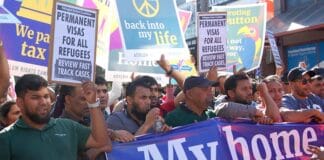As expected, in the first sitting of the new Parliament, Home Affairs Minister Peter Dutton moved to repeal the Medevac Bill.
Dutton’s move has been temporarily stalled while the Bill is reviewed by a Senate committee that won’t report until mid-October.
It is now likely to come to Parliament in the November sitting. But there can be no doubt that the government’s intention is to overturn it and restrict medical transfers from offshore to Australia.
The medical need is clear. Since the Bill was introduced in March the government has agreed to transfer around 80 people under the provisions of the Act—mostly from Manus Island.
It is a pitifully small number, but before the Medevac Bill, Manus was a medical black hole, with the government refusing medical transfers and the Pacific International Hospital (PIH) obstructing the provision of medical records, making court action in Australia all but impossible.
The government wants to go back to the days when it had effectively total control and could deny medical treatment to refugees with impunity.
The government is also hiding behind the extraordinary efforts of the Nauru government to obstruct medical transfers. But after a scathing Federal court finding to that effect in one case, a week later, the government finally transferred the refugee from Nauru.
Typically, the government is using the language of national security to try and drive the repeal motion through Parliament. Dutton told the parliament, “As a nation it is imperative we are able to determine who enters Australia and whether they should remain in our borders permanently.”
The 20 July rallies, marking six years of the Pacific Solution Mk II that began the present offshore regime, are an important part of building the campaign against the repeal. But it is also clear that the Medevac Bill is not going to get everyone off Manus and Nauru.
The government is also moving to re-introduce the Lifetime Ban bill that would prevent any refugee resettled in any third country (like the US or potentially New Zealand) from ever travelling to Australia. The Bill was passed by the House of Representatives in 2016, but was never put to the Senate as it was obvious that the Liberals did not have the numbers. Now the government is coming back for another go.
‘Australian solution’
There is another reason to build the refugee campaign in Australia—Donald Trump and other racist politicians in Europe are openly using the “Australian solution” as an international model for inhuman refugee policies.
In June, Trump tweeted that “much can be learned from Australia’s policies”, along with posters from Operation Sovereign Borders threatening that refugees would never be resettled in Australia.
Trump’s policies on the Mexican border resemble nothing as much as Australia’s detention centres. While Trump declared that the detention centres were “beautifully run,” and “clean”, a reporter travelling the Vice President Mike Pence in July described the horrendous stench from one all-male detention centre that was “so crowded it would have been impossible for all of them to lie down”.
The “Australian model” is also the inspiration for the Italian government’s ban on refugee rescue boats docking in Italian ports. In August 2018, the far right Italian deputy Prime Minister, Matteo Salvini, bragged about introducing Australia’s model of the Pacific Solution to Italy.
In late June this year, Carola Rackete, the German captain of the rescue ship, Sea Watch 3 was arrested after defying the Italian government’s orders not to land 42 asylum seekers. The captain of a second ship, the Italian NGO vessel, Mediterranea is also “under investigation” for breaking the Italian government’s ban on landing asylum seekers.
A third ship, Alan Kurdi, headed for Malta after being stranded in international waters off Lampedusa with 65 rescued asylum seekers on board. Some of them had been in detention centres in Libya for five years—sound familiar?
The Italian government’s policy of denying entry to asylum boats and forcing rescue boats to return asylum seekers to Libya and Tunisia, follows the Australian government’s Operation Sovereign Borders naval blockade that turns boats back to Indonesia and asylum seekers to Sri Lanka.
Thirty thousand people demonstrated across Germany (8000 in Berlin, 4000 in Hamburg) in solidarity with Carola Rackete, against Italy’s refugee blockade.
As right-wing politicians across the globe look to the “Australian solution”, protests in Australia to end offshore detention and boat turnbacks have taken on increased importance as a demonstration of domestic opposition and international solidarity.
Dutton even wants to turn back sick refugees to Manus and Nauru. We need to break the Morrison government’s refugee blockade. The demand to open the borders and “bring them here” the refugees has never been more important.
By Ian Rintoul





